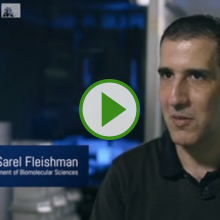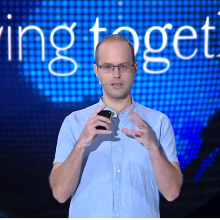Meeting the moment
Since October 7, the Davidson Institute has played a critical role in providing educational activities and fostering resilience among children displaced by the conflict
Students

Biology Matriculation students experimenting and sampling. The student on the left wears a t-shirt with images of three boys from their grade who were killed on October 7; she was the girlfriend of one of them.
By Dinah Elashvili
"עוד לא אבדה תקוותנו" – “Our hope is not yet lost.”
This line from Israel’s national anthem encapsulates the spirit of resilience and hope that the Davidson Institute of Science Education—the science literacy arm of the Weizmann Institute—has been working tirelessly to instill, even in the face of tremendous adversity, since opening its doors in 1999.
No misfortune—from pandemics to political unrest—has brought into sharper focus the Davidson Institute’s mission to cultivate an environment that ensures the growth and success of future generations more than the traumatic events of October 7.
Since the outbreak of the war, the Davidson and Weizmann Institutes have spared no effort in providing relief to families displaced by the conflict. Recognizing the critical role of education in fostering resilience and maintaining some level of normalcy, the Davidson Institute immediately launched numerous activities tailored for the evacuees—particularly children. These included science storytelling sessions, special talks, and hands-on experiments, along with the expansion of Davidson’s digital resources, which feature riddles, games, videos, articles, and other educational content.
Active engagement
The community of Yakhini, located near the border of the Gaza Strip, was one such population that found themselves displaced and relocated to a school in Jerusalem, where makeshift classrooms were established to cater to their educational needs.
The Davidson Institute collaborated with Yakhini and many other evacuated border towns to bring Active Science—a program designed to deliver fundamental scientific concepts through immersive, hands-on learning experiences—to their communities. Operating in locations across the country—from temporary schools, to on-site war-affected schools, to classes taught on the Davidson campus—Active Science is flexible by its very nature, and was easily adapted to suit the needs of each group.
From the onset, the distress of the participating students was obvious: they were unable to focus and their confidence in themselves faltered. Their foundation had been shattered, and their sense of security and stability was gone. Not knowing when or if they would return to their homes, they felt robbed of the comfort of routine and familiar surroundings.
Adapting the Active Science program to suit the singular needs of these students, the Davidson Institute focused on facilitating informal instruction, with an emphasis on interactive discussions and interpersonal engagement. Exploring topics such as solar energy and density, students were gently encouraged to conduct experiments and construct models and were slowly able to rekindle their curiosity and restore their fondness for discovery.
Keeping on the path
The Biology Intensive Matriculation Seminars are another notable Davidson wartime initiative. Recognizing the need for 11th- and 12th-grade biology students to fulfill their academic requirements, despite displacement and trauma, the Davidson Institute introduced an immersive three-day seminar at Davidson’s Youth Village, located on the Weizmann campus. These meetings provided a focused learning environment where participants could engage in interactive study sessions—a much-needed escape for students, many of whom had lost family, friends, and classmates on October 7.
With the guidance and support of their teachers and Davidson staff, young students from various war-torn communities, such as Kibbutz Nir Oz, Nahal Oz, Be’eri, Sderot, Mefalsim, Gevim, and more, had the opportunity to study closely with Weizmann scientists from various research groups, such as the labs of Profs. Avi Levy and Yuval Eshed in the Department of Plant and Environmental Sciences and of Prof. Ziv Reich in the Department of Biomolecular Sciences.
The horrific events of October 7 have deeply affected not only students but also their teachers, and this program has been instrumental in helping these educators reconnect with their life passion.
“This experience has made it possible to regain my position as a teacher, mentor, and guide to my students,” one participant said. “This is a role that is important for me and for them, and I have been able to reconnect with my professional self through the support and atmosphere created by the program.”
Science on demand
The Davidson Institute has also been busy creating web-based content that can be used independently by teachers and other science enthusiasts. This online content provides curriculum-appropriate, all-in-one science lesson plans and activities, on topics ranging from biology and chemistry to astrophysics and environmental science.
Since October, the number of active users has tripled, in light of the extra support needed for educators during the ongoing war. By offering a vast array of pedagogical online resources, the Davidson Institute has ensured that countless teachers have access to high-quality educational content, enabling them to maintain a standard of excellence for their students despite the strenuous circumstances.
By reaching those most directly impacted by the ongoing war, the Weizmann and Davidson Institutes are offering the means to restore our faith in humanity, showing us that “our hope is not yet lost.”
Davidson emergency education programs are supported by the President’s Discretionary Fund for Wartime Support. The Weizmann Institute thanks our generous donors to this Fund.








